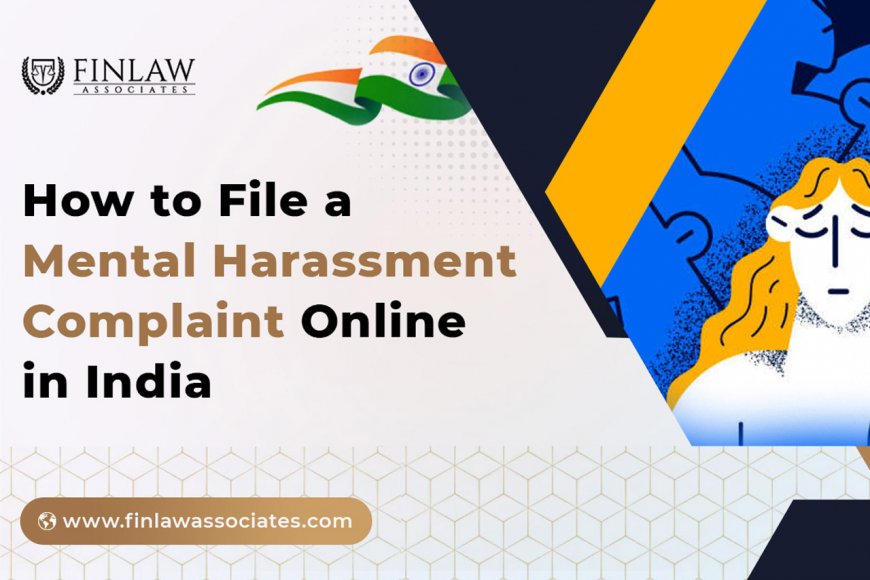How to File a Mental Harassment Complaint Online in India
Learn how to file a mental harassment complaint online in India. Explore legal provisions, complaint platforms, and step-by-step filing procedures.

Mental harassment is a serious issue that affects individuals in various aspects of life, including workplaces, personal relationships, and online interactions. With the increasing use of digital platforms, online harassment has become a significant concern. Fortunately, the Indian legal system provides various avenues for victims to file complaints online. This guide offers a comprehensive overview of how to file a mental harassment complaint online in India, ensuring victims can seek justice effectively.
Understanding Mental Harassment
Mental harassment refers to any action that causes psychological distress to an individual. This includes:
-
Verbal Abuse: Insults, offensive remarks, and threats that cause emotional distress.
-
Emotional Manipulation: Gaslighting, undue criticism, or mental torture.
-
Workplace Harassment: Bullying, undue pressure, or discrimination in professional settings.
-
Cyberbullying and Online Harassment: Defamation, cyberstalking, and abusive messages sent through social media, email, or other digital means.
Recognizing these behaviors is crucial for victims to take appropriate legal action.
Legal Provisions Addressing Mental Harassment in India
While "mental harassment" is not explicitly defined in Indian law, various legal provisions provide protection:
Indian Penal Code (IPC):
-
Section 294: Punishes obscene acts or words in public.
-
Section 354: Protects against acts intended to outrage a woman's modesty.
-
Section 499: Covers defamation cases.
-
Section 506: Deals with criminal intimidation, including threats.
-
Section 509: Addresses acts intended to insult a woman's dignity.
Information Technology (IT) Act, 2000:
-
Section 66A: Prohibits sending offensive or menacing messages via electronic means.
-
Section 67: Regulates the transmission of obscene content online.
-
Section 67A: Penalizes publishing sexually explicit content.
Sexual Harassment of Women at Workplace (Prevention, Prohibition, and Redressal) Act, 2013:
-
Mandates the formation of Internal Complaints Committees (ICCs) in organizations to address complaints of workplace harassment.
Steps to File an Online Complaint for Mental Harassment
Victims can file an online complaint for mental harassment through multiple platforms, depending on the nature of the harassment.
1. National Human Rights Commission (NHRC):
The NHRC handles cases of human rights violations, including mental harassment.
-
Visit: NHRC Complaint Portal
-
Process:
-
Select the state where the incident occurred.
-
Provide details of the complaint and upload relevant documents.
-
Submit the complaint and note the tracking number.
2. National Commission for Women (NCW):
For cases involving harassment of women, the NCW provides an online grievance redressal system.
-
Visit: NCW Online Complaints
-
Process:
-
Register and log in.
-
Fill in the complaint details and submit supporting evidence.
-
Receive a reference number for tracking.
3. Cyber Crime Reporting Portal:
For online harassment cases, including cyberstalking and defamation.
-
Visit: Cyber Crime Portal
-
Process:
-
Choose "Women/Child Related Crime" or "Other Cyber Crimes."
-
Provide details and upload evidence.
-
Submit the complaint and receive a tracking ID.
4. Local Police E-Complaint Systems:
Many state police departments allow online complaint filing.
-
Visit: The official website of your state's police department.
-
Process:
-
Navigate to the e-complaint section.
-
Fill in details and submit the complaint.
-
Note the acknowledgment number for follow-up.
How to Strengthen Your Mental Harassment Complaint
To ensure a strong case, follow these guidelines:
-
Gather Evidence: Collect screenshots, emails, call recordings, or any written communication supporting your claim.
-
File Early: Report incidents as soon as they occur to avoid delays in investigation.
-
Seek Witnesses: If possible, include statements from witnesses who can validate your claims.
-
Keep Records: Maintain copies of all submitted complaints, responses, and tracking details.
Support Organizations and Helplines
Victims can seek assistance from several organizations that offer legal support and counseling:
-
Safecity: Provides a platform for anonymous reporting of sexual harassment.
-
Cyber Crime Break: Helps combat cyber harassment cases.
-
National Legal Services Authority (NALSA): Offers free legal aid to victims.
-
Helpline Numbers:
-
Women Helpline (1091)
-
Cyber Crime Helpline (155260)
-
NCW Helpline (011-26942369)
Conclusion
Filing an online complaint for mental harassment in India is a crucial step toward seeking justice. Victims should leverage available online complaint platforms, understand their legal rights, and use supporting resources for assistance. The legal framework in India provides strong mechanisms to protect individuals from harassment, ensuring that justice is accessible to all.
To better understand the legal aspects of online harassment, you can refer to this detailed guide on cyberbullying laws in India and penalties for online abuse.
If you or someone you know is facing mental harassment, take immediate action and file a complaint online through the appropriate channels. Your mental well-being and legal rights deserve protection.
What's Your Reaction?















